Content
Foul play: millions of Europeans watch sporting events illegally and buy fake sports equipment costing manufacturers €850 million
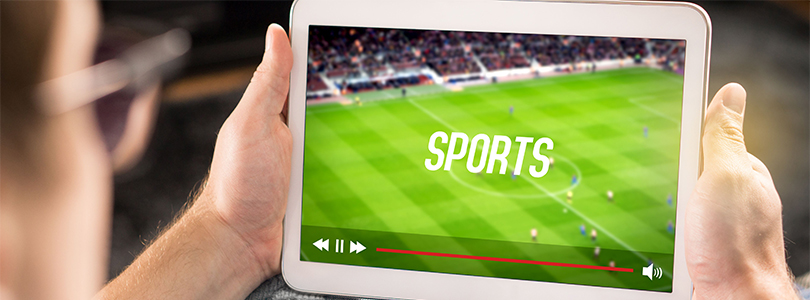
Europe-wide "Play Fair" campaign launched
This year, Europe is the epicentre of all things sport. The world is gearing up to watch spectacular goals during the UEFA EURO 2024, photo finishes at the Tour de France and gold-medal-winning moments at the Olympic and Paralympic Games in Paris.
But as Europeans prepare to tune into the biggest broadcast sporting events, millions of them may do so illegally. According to an EUIPO study on EU citizens’ perception, awareness, and behaviour, 12% of EU citizens had accessed or streamed content from illegal sources to watch sports. When it comes to youngsters age 15-24, more than a quarter (27%) admit to using illegal online channels to watch sports.
DPMA President Eva Schewior explains: "In sport, as in economic competition, fair play is essential - plagiarism and unsportsmanlike behaviour distort the game. We must also enforce clear rules when it comes to intellectual property. The DPMA is committed to these rules and supports the EUIPO's 'Play Fair' campaign."
Play Fair: High numbers of illegal streams and counterfeit sports goods are damaging the industry - New campaign appeals to fans
- 9 per cent of Germans have already watched or streamed sports content from illegal sources - in the 15-24 age group, the figure was as high as 21 per cent
- Across the EU, counterfeit sporting goods manufacturers suffer losses of EUR 850 million per year - 11 per cent of the industry's turnover
- 11 per cent of young Germans aged between 15 and 24 have knowingly bought counterfeit sporting goods online
- 8 million counterfeit luxury and sports goods with an estimated retail value of EUR 120 million have been tracked down and confiscated by police authorities across Europe
- Ahead of upcoming global sporting events, the "Play Fair" campaign is launched - an appeal to fans to watch official broadcasts and buy authorised merchandise
Big events, big opportunity for fraud
Beyond the broadcast rights involved in major sporting events, intellectual property (IP) is everywhere: from the iconic ![]() Olympic rings and the names and likeness of top athletes, to the competitors’ sports gear and the official mascots and souvenirs of the events.
Olympic rings and the names and likeness of top athletes, to the competitors’ sports gear and the official mascots and souvenirs of the events.
But where there’s money and millions of spectators and consumers, there is opportunity for fraudsters to profit. Illegal online streaming affects all types of content – including sporting events – and the ![]() EUIPO estimated that piracy across all media generates €1 billion in unlawful revenue annually.
EUIPO estimated that piracy across all media generates €1 billion in unlawful revenue annually.
The problem of live-event piracy is an existential one for the financing of sport. The revenues generated through IP rights are redistributed to the sports movement and athletes on the basis of solidarity.
Nearly half of youngsters illegally stream sports in some countries
![]() EUIPO’s IP perception study revealed significant trends across the European Union related to the online piracy of live sports events, where 12% of the total population has accessed or streamed content from illegal online sources to watch sports.
EUIPO’s IP perception study revealed significant trends across the European Union related to the online piracy of live sports events, where 12% of the total population has accessed or streamed content from illegal online sources to watch sports.
Bulgaria is where this practice is most common in the EU with 21% of total respondents admitting they had used illegal online sources to watch sports, followed by Greece (20%), Ireland (19%), Spain (19%) and Luxembourg (18%).
Younger citizens age 15-24 reported illegally accessing sporting events online at twice the rate of the total population, according to the study. Bulgarian youth are most likely to engage in illicit sports streaming with 47%, well above the EU average of 27%, followed by Spain (42%) and Greece (42%), Slovenia (39%) and Ireland (34%).
According to the EUIPO’s study on online copyright infringement, streaming is the most popular method to access illicit TV content – 58% of piracy in the EU occurs via streaming and 32% through download.
EUIPO Scoreboard on intellectual property and youth
According to the ![]() EUIPO Scoreboard 2022 on Intellectual Property and Youth, on average, 10 per cent of young people in the 15-24 age group in the EU admit to knowingly buying counterfeit sporting goods. This is most common among Greek young people, 18 per cent of whom admit to having done so. Young people in Germany are in line with the EU average here: 11 per cent of young Germans aged between 15 and 24 have knowingly bought counterfeit sporting goods online. In contrast, the proportion of young consumers in Europe who admitted to having unintentionally bought counterfeit goods was 7 per cent.
EUIPO Scoreboard 2022 on Intellectual Property and Youth, on average, 10 per cent of young people in the 15-24 age group in the EU admit to knowingly buying counterfeit sporting goods. This is most common among Greek young people, 18 per cent of whom admit to having done so. Young people in Germany are in line with the EU average here: 11 per cent of young Germans aged between 15 and 24 have knowingly bought counterfeit sporting goods online. In contrast, the proportion of young consumers in Europe who admitted to having unintentionally bought counterfeit goods was 7 per cent.
Counterfeit sporting goods cause damage totalling 850 million euros
These sales of counterfeit goods have serious consequences: According to calculations by the EUIPO, the damage to the EU is estimated at a total of EUR 850 million per year - which corresponds to 11 per cent of total turnover in the industry.
Counterfeiting has serious economic and social consequences. In addition to loss of sales and job losses, which were also documented in another study recently presented by the EUIPO on the economic impact of counterfeiting in the clothing, cosmetics and toy industries in the EU, inferior copies also lead to damage to brand value.
Keyword "Agorateka": How you can recognise legal online content offerings
There are various ways to earn money from illegal live broadcasts: for example, through illegal subscription services or through open internet streams that are financed by advertising revenue. Criminals working in this area use sophisticated techniques to evade detection - they often use legal services to distribute the content. Online piracy even occurs when events such as the Olympic Games or the final rounds of the UEFA European Championship are broadcast by free-to-air broadcasters.
Across the EU, Member States and stakeholders are tackling live event piracy with relevant legislation and technology to block illegal online services. In addition, anti-piracy work includes raising consumer awareness of the problem and providing information on where to find legal digital content. The EUIPO's ![]() Agorateka is a tool that helps viewers recognise which online content (including sports events) is legal.
Agorateka is a tool that helps viewers recognise which online content (including sports events) is legal.
Operation "Fake Star" - combating counterfeit goods in Europe
As part of Operation Fake Star - an initiative against counterfeiting of widely recognised branded products - 8 million counterfeit luxury and sporting goods, more than half of the 14 million counterfeits seized in 2023, were tracked down and confiscated by police authorities across Europe. The counterfeit sports goods included counterfeit textiles, shoes, labels, leather goods and clothing accessories, including sports shoes and sportswear. The retail value was estimated at EUR 120 million. This operation led to the arrest of 264 people suspected of involvement in counterfeiting.
Further information on the "Play fair" campaign can be found on the ![]() EUIPO's website.
EUIPO's website.
Picture 1: iSDtock.com/Tero Vesalainen, Picture 2: iStock/lioputra (Red card), Picture 4: iStock/Алексей Белозерский (Laptop), Picture 4: iStock/YOKO (Shopping trolley), Picture 5: iStock/S-S-S (trainers), Bild 6: DPMA
Last updated: 19 May 2025

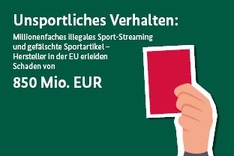
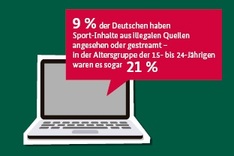
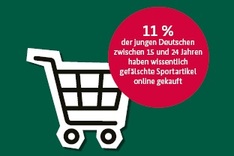
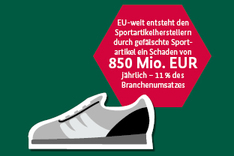
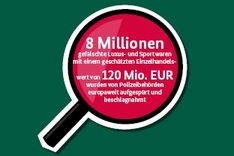
Not only protecting innovations
Social Media